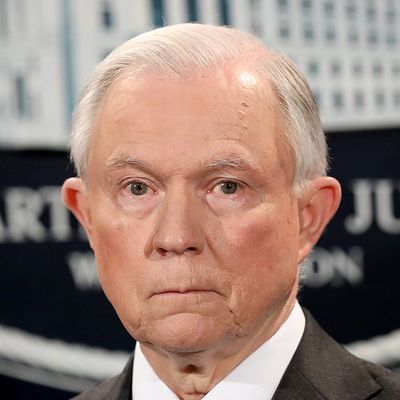
After Jeff Sessions became Donald Trump’s choice as attorney general, there was a lot of speculation over the extent to which the stern drug warrior might make life difficult for producers and consumers of cannabis in the growing number of states that had decided on legalizing recreational marijuana use. Sessions was a bit evasive on the subject in his confirmation hearings, acknowledging that messing with legalized pot represented a “resource issue” for federal law enforcement that had not yet been resolved. But it was generally assumed the Department of Justice would give a pass to the growing number of states with legalized medical marijuana (29 of them at the moment), partly because medical marijuana is generally very popular, and partly because Donald Trump himself expressed support for allowing it during the campaign.
Now it looks like the assumption medical marijuana was not going to be a Trump-administration target was premature. A letter Sessions sent to Congress last month has come to light, requesting elimination of a bipartisan appropriations provision prohibiting use of federal funds to interfere with legal medical-marijuana regimes. The basis of the request was pretty clear:
“I believe it would be unwise for Congress to restrict the discretion of the Department to fund particular prosecutions, particularly in the midst of an historic drug epidemic and potentially long-term uptick in violent crime,” Sessions wrote in a letter to Republican and Democratic House and Senate leadership. “The Department must be in a position to use all laws available to combat the transnational drug organizations and dangerous drug traffickers who threaten American lives.”
It clearly didn’t get much attention, but Trump himself expressed a reservation about the prohibition Sessions dislikes in a signing statement on the current-year omnibus appropriations bill. Sessions’s letter was aimed at next year’s appropriations measures. But it simply said the president was not giving up “my constitutional responsibility to take care that the laws be faithfully executed.”
Sessions’s effort to establish a rationale for Trump to abandon his assurances on medical marijuana doesn’t much pass the smell test, as the Washington Post’s Christopher Ingraham notes:
Sessions’s citing of a “historic drug epidemic” to justify a crackdown on medical marijuana is at odds with what researchers know about current drug use and abuse in the United States. The epidemic Sessions refers to involves deadly opiate drugs, not marijuana. A growing body of research (acknowledged by the National Institute on Drug Abuse) has shown that opiate deaths and overdoses actually decrease in states with medical marijuana laws on the books.
And Sessions’s formulation of a “potentially long-term uptick in violent crime” is weaselly: The “uptick” in certain violent crimes is “potentially short-term” as well, and neither Sessions nor anyone else has established a connection between medical marijuana and violent crime. Indeed, as the Brookings Institution’s John Hudak’s commented, Sessions’s language represented a “scare tactic” at a time when fears about the opioid epidemic are very high.
As it happens, and deliberately or not, publicity about Sessions’s letter spread on the same day he is testifying before the Senate Intelligence Committee. It is a reminder that this man has a stern and unforgiving attitude towards law-breaking — at least when it involves his pet preoccupations of fighting voting-rights activists and bringing back the War on Drugs.






























